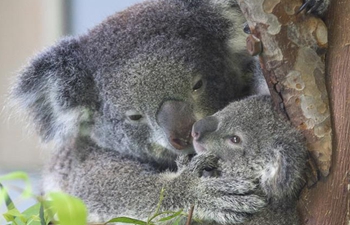by Raul Menchaca
HAVANA, Aug. 20 (Xinhua) -- Mexican marching band Panteras has been a big hit at this year's carnival celebrations here, the city's biggest annual festival.
With their white uniforms, phosphorescent hats, and lively beat, the young musicians, from the Gulf Coast state of Veracruz's Bachelors College (Cobaev), have won over the audience, and underscored the friendly ties between Mexico and Cuba.
"I think our historical ties are stronger. There is tremendous affection for Mexicans, we can feel it," the band's director, Jorge Alberto Morales, told Xinhua.
Trained in the violin and trombone, Maestro Morales, as band members respectfully call him, is moved when he recalls the cries of "Viva Mexico!" heard from carnival revelers each time they play.
The band debuted in style at the opening ceremony of the carnival on Friday along Havana's famed Malecon, or seaside promenade, where 18 dance troupes and 14 floats paraded by.
Panteras came with 100 musicians, though the band has 250 members.
Veracruz has 14 marching bands formed by students from 56 public schools, where they receive music classes as an elective subject to complement their high school studies.
Students who choose to study music receive two hours of classes each week.
Traditional Mexican music, as well as mambo, danzon and boleros, make up the repertoire of the band.
"We are delighted to be in this fraternal country that has invited us," said Amanda de Leon, who traveled to Cuba to accompany her granddaughter, a clarinet player.
Dressed in a colorful typical Mexican costume, she is part of a small group of women that march at the head of the band with a large banner highlighting the ties between the two countries.
This is the first time the band has performed in Cuba, and it introduced itself by holding a surprise performance at the central corner of 23rd and L streets, one of the busiest intersections in the capital, from where it marched five blocks to the Malecon.
Many joined the improvised street party and accompanied the group on its way to the seafront.
"It's a beautiful presentation, especially because they know how to interpret our songs very well," said Alina Valdes, a septuagenarian Afro-Cuban woman accompanying her granddaughter, who watched the band with glee.
A Puerto Rican family visiting Cuba, Aristides David and his wife Aixa Castillo, and their teenage son, said they were staying at the same hotel as the band, but confessed they had no idea the musicians were so talented.
On another corner, carnival goer Desiderio Cabrera subtly bopped his head to the rhythm of the band.
What does he think of the musicians?
They're "a spectacular group," he said.













